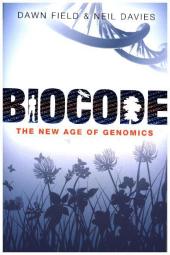 Neuerscheinungen 2016Stand: 2020-02-01 |
Schnellsuche
ISBN/Stichwort/Autor
|
Herderstra▀e 10
10625 Berlin
Tel.: 030 315 714 16
Fax 030 315 714 14
info@buchspektrum.de |

Neil Davies, Dawn Field
(Beteiligte)
Biocode
The New Age of Genomics
2016. 208 p. w. 9 figs. 19,5 cm
Verlag/Jahr: OXFORD UNIVERSITY PRESS 2016
ISBN: 0-19-968776-5 (0199687765)
Neue ISBN: 978-0-19-968776-3 (9780199687763)
Preis und Lieferzeit: Bitte klicken
In Biocode, Dawn Field and Neil Davies capture the scale and excitement of the rapidly growing field of genomics. From automatic DNA sequencing of newborns to synthetic life, and the sequencing of whole ecosystems, genomics is set to revolutionize our understanding of life on Earth and affect us all.
The living world runs on genomic software - what Dawn Field and Neil Davies call the ┤biocode┤ - the sum of all DNA on Earth. In Biocode, they tell the story of a new age of scientific discovery: the growing global effort to read and map the biocode, and what that might mean for the future. The structure of DNA was identified in 1953, and the whole human genome was mapped by 2003. Since then the new field of genomics has mushroomed and is now operating on an
industrial scale. Genomes can now be sequenced rapidly and increasingly cheaply. The genomes of large numbers of organisms from mammals to microbes, have been mapped. Getting your genome sequenced is becoming affordable for many. You too can check paternity, find out where your ancestors came from, or
whether you are at risk of some diseases. Some check out the pedigree of their pets, while others turn genomes into art. A stray hair is enough to crudely reconstruct the face of the owner. From reading to constructing: the first steps to creating artificial life have already been taken.
Some may find the rapidity of developments, and the potential for misuse, alarming. But they also open up unprecedented possibilities. The ability to read DNA has changed how we view ourselves and understand our place in nature. From the largest oceans, to the insides of our guts, we are able to explore the biosphere as never before, from the genome up. Sequencing technology has made the invisible world of microbes visible, and biodiversity genomics is revealing whole new worlds within us and
without. The findings are transformational: we are all ecosystems now. Already the first efforts at ┤barcoding┤ entire ecological communities and creating ┤genomic observatories┤ have begun. The future, the authors argue, will involve biocoding the entire planet.
Dawn Field is a Senior Research Fellow at the Oxford eResearch Centre at the University of Oxford, and the Head of Molecular Evolution and Bioinformatics Group, Biodiversity Programme, at the NERC Centre for Ecology and Hydrology. She has collaborated on metagenomics studies of the ┤L4 site┤ in the Western Channel Observatory, making it one of the best-characterized microbial communities in the world.
Neil Davies lives on Moorea (sister island to Tahiti) in French Polynesia where he is the Executive Director of the University of California Berkeley┤s Gump South Pacific Research Station. He is the lead principal investigator of the Moorea Biocode Project, a $5m effort to sequence (DNA barcode) all non-microbial species on the island.
Both are Research Associates of the Biodiversity Institute of Oxford where they are using their complementary experiences to cofound the international Genomic Observatories (GOs) Network. They have published more than 140 scientific articles (including in Science, Nature, Nature Genetics, Nature Biotechnology, Nature Methods, and PNAS) and have research interests in evolution, population genetics, genomics, metagenomics, DNA barcoding, bioinformatics, biodiversity, and data
sharing. Both believe strongly in the power of concerted, international community-driven scientific actions. Field is the founder of the Genomic Standards Consortium, a growing nexus point for a wide range of international projects in this domain and both serve on its Board. Together they are working to help champion
the emergence of ┤biodiversity genomics┤ as a scientific field.


